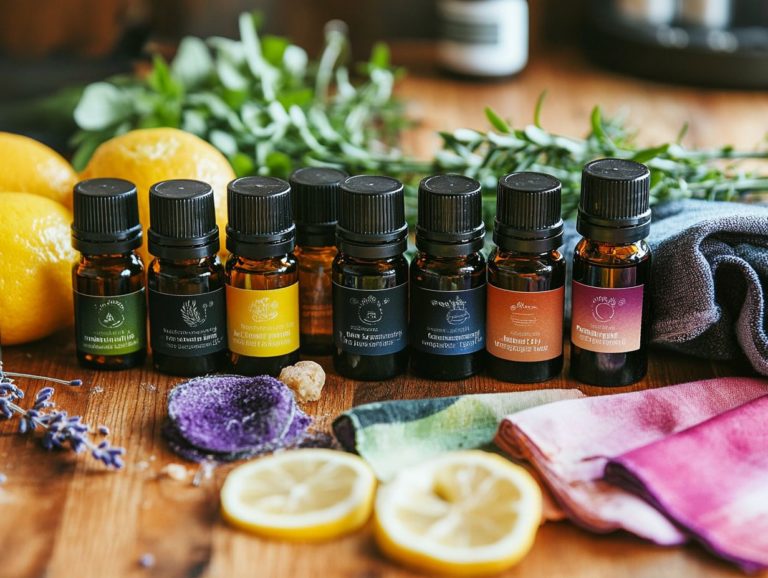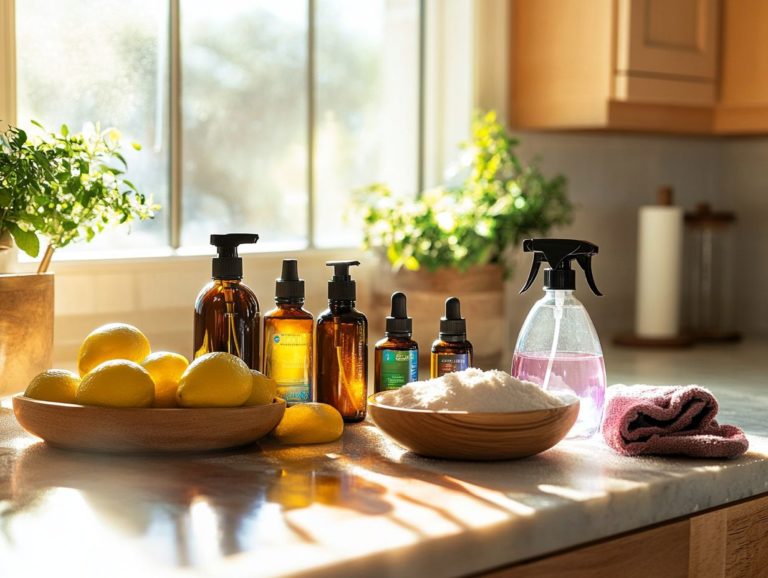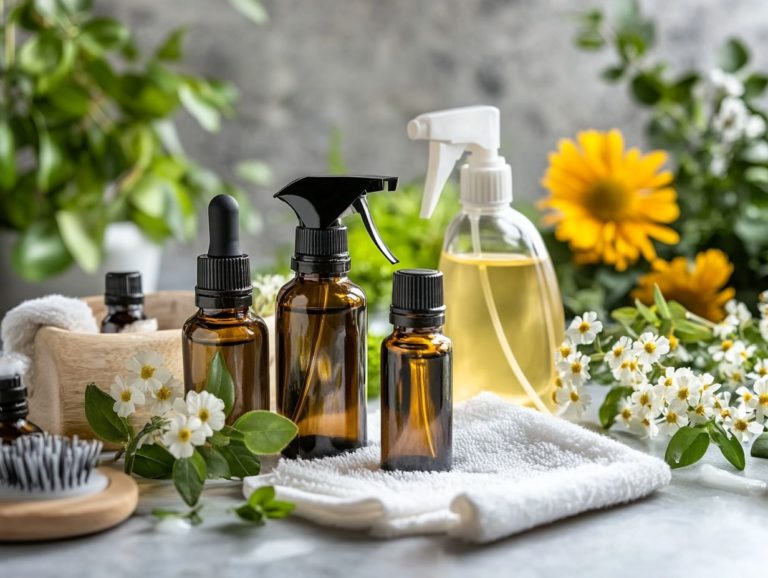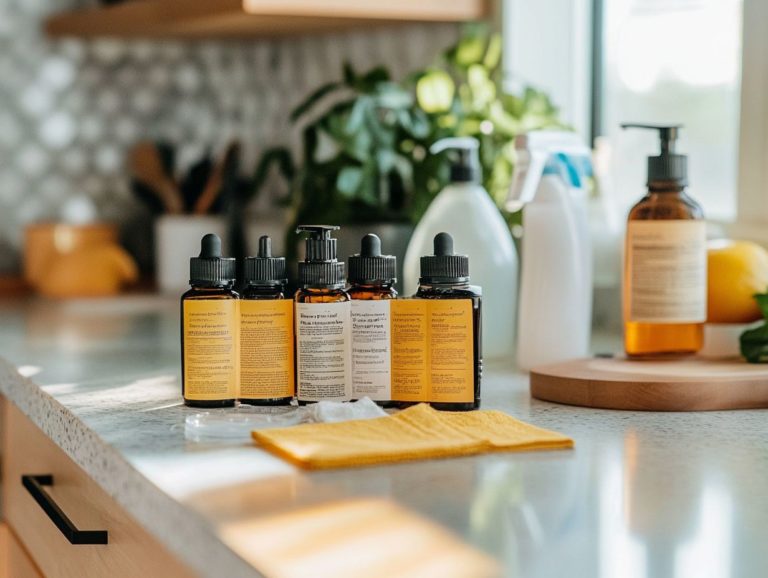Exploring Essential Oils for Home Care
Essential oils have emerged as a sophisticated choice for enhancing your home care routine, presenting a natural and aromatic alternative for cleaning, refreshing, and promoting personal well-being. Integrating essential oils into your self-care and personal care routines can offer significant emotional wellness and mindfulness benefits.
Whether you find tranquility in the calming scent of lavender or are uplifted by the invigorating aroma of peppermint, these oils do more than just elevate your living space; they come packed with a host of benefits.
Get ready to explore the best essential oils for your home care that invigorate your space and uplift your mood! This article offers safe usage tips, essential oil safety guidelines, delightful DIY recipes, and discusses potential risks, empowering you to confidently integrate these potent oils into your daily routine.
Contents
- Key Takeaways:
- What Are the Best Essential Oils for Home Care?
- How to Use Essential Oils Safely in Home Care?
- What Are Some DIY Essential Oil Home Care Recipes?
- Are There Any Risks or Side Effects of Using Essential Oils in Home Care?
- Frequently Asked Questions about Residential Care Using Essential Oils
- What are essential oils and how can they be used for home care?
- What are the benefits of using essential oils for home care?
- Which essential oils are best for cleaning and disinfecting?
- How can essential oils be used for relaxation and stress relief in the home?
- Are essential oils safe to use around children and pets?
- Can essential oils be used for pest control in the home?
Key Takeaways:
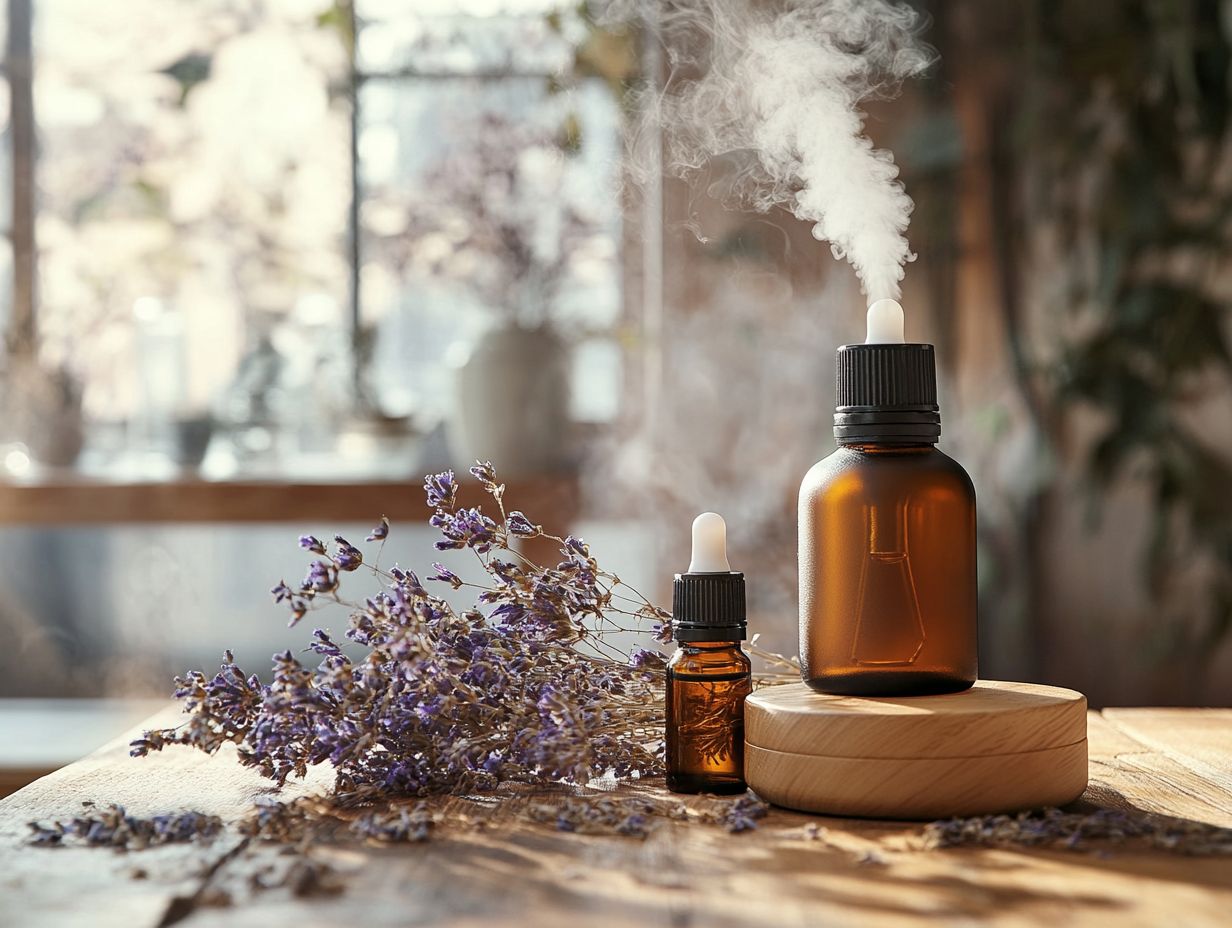
- Essential oils like lavender, tea tree, lemon, eucalyptus, and peppermint are versatile and effective for home care.
- Proper dilution, patch testing, following recommended dosages, and proper storage are key to safely using essential oils in home care.
- DIY recipes like all-purpose cleaning spray, natural air freshener, homemade laundry detergent, and DIY insect repellent are easy and cost-effective ways to incorporate essential oils into home care.
- Using essential oils can support emotional wellness and stress relief when incorporated into using scents to help you relax and personal care routines.
What Are the Best Essential Oils for Home Care?
Selecting the finest essential oils for your home care is vital for cultivating a harmonious atmosphere that nurtures emotional wellness and mindfulness. Essential oils can also be used in various relaxation techniques such as meditation and yoga. These powerful oils not only infuse your space with delightful natural fragrances but also promote relaxation and overall well-being through their myriad health benefits.
Imagine the soothing embrace of Lavender’s calming properties or the invigorating cleansing prowess of Tea Tree Oil; each essential oil presents distinct advantages tailored to your personal care and health practices. They are also known to improve mood and offer anxiety relief.
By seamlessly incorporating these premium oils into your home care routine, you can start using these oils today to elevate your mood and transform your home into a calming oasis!
1. Lavender Oil
Lavender Oil is celebrated for its calming effects, establishing itself as a must-have in both using scents to help you relax and personal care routines.
This essential oil is your go-to for enhancing relaxation and improving sleep quality, offering a natural remedy for anyone seeking relief from the burdens of stress and anxiety. By simply adding a few drops of Lavender Oil to your essential oil diffuser, you can create a soothing atmosphere that fosters tranquility in your space. You can also incorporate it into various aromatherapy products and herbal remedies, such as candles and massage oils, amplifying its relaxing benefits.
Beyond its physical applications, Lavender Oil serves as a powerful emotional support tool, often integrated into wellness strategies designed to promote mental clarity and emotional balance.
2. Tea Tree Oil
Tea Tree Oil is renowned for its remarkable ability to fight germs, positioning it as an exceptionally versatile choice for both skincare and home care applications. Using Tea Tree Oil is beneficial for various skin care routines.
You ll find this essential oil to be a soothing remedy for skin irritations such as acne, eczema, and psoriasis, offering a natural alternative to synthetic products and medication alternatives. By incorporating it into your lotions or diluting it with a carrier oil, you can create a calming solution that promotes healing and reduces redness effectively.
The disinfectant qualities of Tea Tree Oil make it a preferred ingredient in natural household cleaners and aromatic baths, allowing you to tackle germs on surfaces without resorting to harsh chemicals. Many are embracing this powerful oil as a complementary treatment for various ailments, recognizing its potential to alleviate skin disorders and enhance overall well-being.
3. Lemon Oil
Lemon Oil is renowned for its uplifting scent and its use in essential oil blends. It has the remarkable ability to enhance your mood and foster emotional wellness.
Not only does this essential oil revitalize your space, but it also acts as an exceptional natural fragrance in personal care and home care products, infusing your surroundings with a refreshing aroma. In the world of aromatherapy, the practice of using scents to improve mood and health, you can diffuse Lemon Oil to create a calming atmosphere that encourages mindfulness and body care, allowing you to center your thoughts and alleviate stress.
Its bright citrus scent blends beautifully with other essential oils, deepening relaxation during meditation or yoga sessions. By incorporating Lemon Oil into your daily routine, you can instantly boost your well-being and cultivate a profound sense of tranquility.
4. Eucalyptus Oil
Eucalyptus Oil is renowned for its invigorating scent, a staple in your journey toward respiratory health, essential oil research and emotional clarity.
Its benefits extend far beyond that. This versatile oil significantly enhances your aromatherapy experience, bringing a sense of relaxation that helps you find tranquility during meditation and yoga practices. Eucalyptus Oil can also be integrated into essential oil therapy.
When diffused in a calm environment, its aromatic properties work wonders to clear your mind, creating a peaceful atmosphere that promotes deeper focus and mindfulness. The oil s soothing qualities can also aid in reducing stress and anxiety, contributing to your overall well-being.
As you add Eucalyptus Oil to your daily routine, you might discover that it not only grounds your thoughts but also elevates your spiritual experiences and supports mindfulness to new heights.
5. Peppermint Oil
Peppermint Oil is celebrated for its refreshing aroma and its roles in relaxing music and essential oil jewelry. Its remarkable ability to elevate energy levels makes it a preferred choice in personal care and home care.
This essential oil proves highly effective in combating fatigue and serves as a natural stimulant, enhancing your focus and mental clarity. When diffused in your workspace, this invigorating oil can significantly improve your concentration, making it especially beneficial during lengthy study sessions or demanding workdays. Peppermint Oil is also beneficial for health practices and emotional support.
Peppermint Oil is also essential in relaxation techniques and wellness strategies. Its soothing properties help ease tension and foster a harmonious home environment. Whether you incorporate it into a calming massage or blend it into a warm bath, it encourages an atmosphere of tranquility and invigoration, striking the perfect balance for your mind and body. Incorporating essential oils into your wellness routines can significantly enhance their benefits.
How to Use Essential Oils Safely in Home Care?
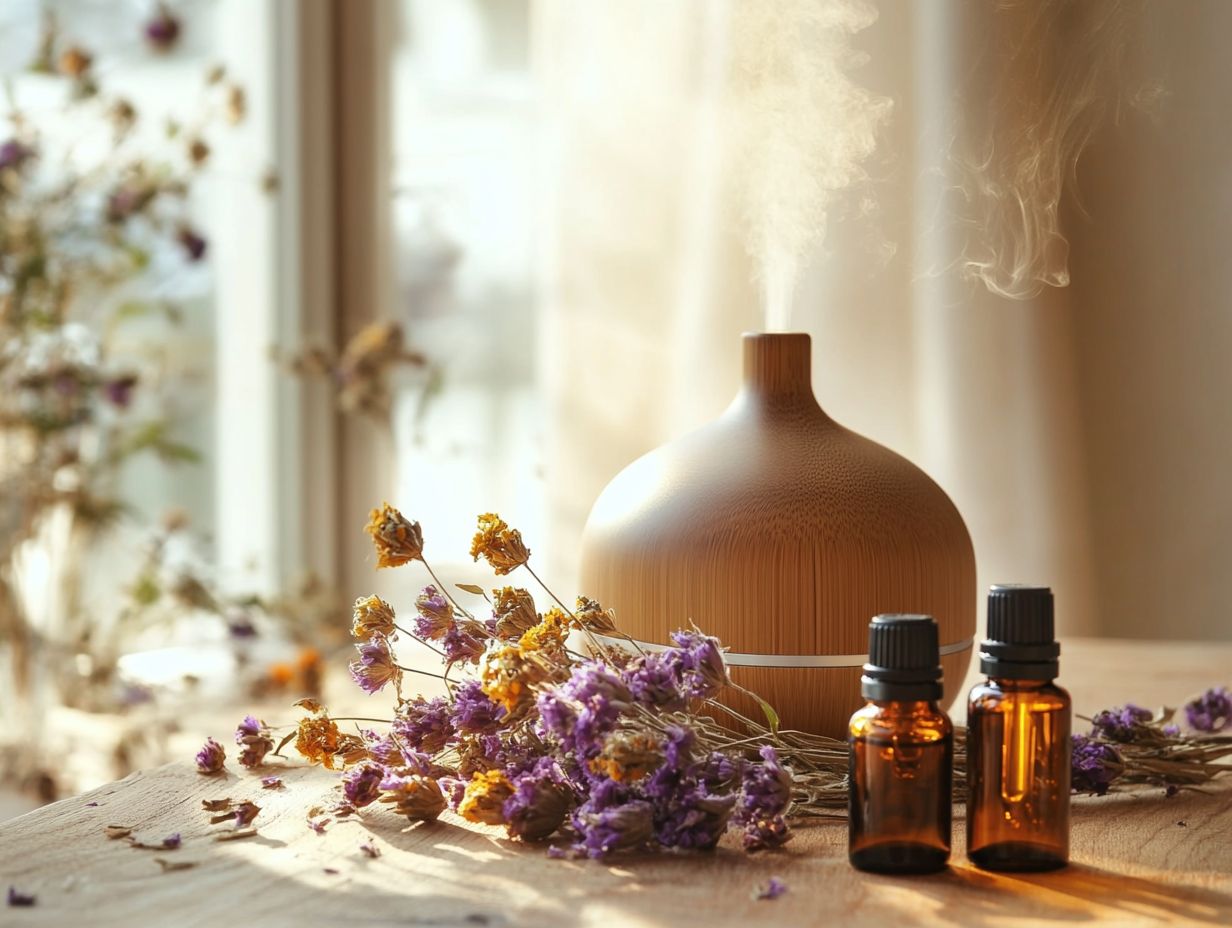
Using essential oils safely in home care is essential for maximizing their health benefits while minimizing any potential risks. Proper application requires you to understand how to dilute essential oils correctly, conduct patch tests, and adhere to recommended dosages to avoid any adverse reactions.
Safety is paramount, particularly with potent oils like Lavender and Tea Tree Oil; improper usage can lead to skin irritation or allergic reactions. Follow essential oil guidelines to enjoy all the benefits these natural remedies provide, creating a healthy and aromatic environment for yourself and your loved ones.
1. Dilute Essential Oils Properly
Diluting essential oils properly is crucial for ensuring safe application and making the most of essential oil uses. Using undiluted oils can lead to skin irritation.
To ensure safety and maximize the benefits of these powerful substances, you must adhere to recommended dilution ratios, which can vary based on the intended use and your individual skin sensitivity. Typically, a ratio of 2-3 drops of essential oil per teaspoon of carrier oil is advisable for most general applications.
Carrier oils are base oils used to dilute essential oils and help apply them safely. Options like sweet almond oil, jojoba oil, and fractionated coconut oil are fantastic choices. They not only dilute the essential oils effectively but also offer their own nourishing benefits to your skin.
By understanding the importance of responsible blending, you can prevent adverse reactions and enhance the therapeutic effects, ensuring a truly enjoyable and safe experience.
2. Patch Test Before Use
Conducting a patch test is an essential step before diving into the world of essential oils, helping you identify potential allergic reactions. Don t miss out on enjoying your favorite scents test first for safety!
Choose a small area of skin, preferably the inside of your forearm, and apply a diluted mixture of the essential oil blended with a carrier oil.
For your initial test, use a concentration of 1-2%. Over the next 24 hours, monitor this area for any signs of irritation, such as redness, itching, or swelling. Oils like lavender, tea tree, and chamomile are generally gentle and often recommended for those new to essential oils.
If you notice no reaction, it’s a good indication that the oil is safe for broader use. However, always proceed with caution and seek professional advice if any concerns arise.
3. Follow Recommended Dosages
Adhering to the recommended dosages for essential oils is essential for ensuring both safety and effectiveness in your use of these aromatic wonders.
Different applications of essential oils require varying dosages because delivery methods significantly influence their potency. For example, when using essential oil diffusers, just a few drops are typically enough to fill a room with a delightful aroma without overwhelming your senses.
When applying oils topically, you must be diligent about diluting them with carrier oils, especially if you have sensitive skin. Using undiluted oils can lead to irritation. Essential oils like Lavender, Tea Tree Oil, and Peppermint have specific guidelines for their use depending on the application method.
Ingesting essential oils is more complicated, demanding a high degree of caution. Some oils can pose safety risks if consumed improperly, so it’s crucial to consult reliable resources or professionals for tailored guidance on appropriate amounts and methods of application. Aromatherapy education can also be beneficial in understanding these complexities.
4. Store Essential Oils Properly and Engage in Self-Care
Proper storage of essential oils is crucial for maintaining their potency and preventing degradation over time. These aromatic extracts are particularly sensitive to light, heat, and air, so store them in dark glass containers. Amber or cobalt blue is ideal, as these colors offer excellent protection against UV rays.
Keep your essential oils in a cool, dark place, away from direct sunlight and temperature fluctuations. Ensure that these oils are stored out of reach of children and pets, as their concentrated nature can lead to unintended consequences if ingested or applied topically without proper guidance.
By following these tips, you ensure that you get the most out of your essential oils while keeping your family safe. Try these tips today and enjoy your essential oils safely!
What Are Some DIY Essential Oil Home Care Recipes?
Creating your own DIY essential oil home care recipes is a splendid way to infuse your living space with natural fragrances and therapeutic benefits. By blending high-quality oils, you can design personalized solutions tailored to your needs, whether it s for cleaning, freshening the air, or enhancing your relaxation. You can also use plant-based products to enhance the natural benefits of essential oils.
These homemade concoctions not only provide effective alternatives to commercial products but also invite you to engage in self-care that nurtures your emotional wellness. From all-purpose cleaning sprays to delightful air fresheners, the options are endless, and you ll love experimenting with transforming your home environment through the remarkable power of essential oils. Aromatherapy practices can significantly enhance your daily living experience by promoting relaxation and well-being. Try these recipes today and transform your home!
1. All-Purpose Cleaning Spray
An all-purpose cleaning spray infused with essential oils is your secret weapon for achieving spotless surfaces while enveloping your home in a delightful aroma. Essential oils like Lemon Oil, Eucalyptus, and Rosemary Oil are excellent choices for these applications.
This versatile solution does more than just banish dirt and grime; it transforms your living space into a fresher, more inviting environment that supports mindfulness.
By adding essential oils like tea tree oil, celebrated for its odor-fighting qualities, or lemon oil, famed for its natural disinfectant properties, you elevate your cleaning ritual to a whole new level. Other oils like Cedarwood Oil and Hyssop can also be incorporated for their unique properties.
To create this elixir, combine one cup of water, one cup of white vinegar, and about 10-15 drops of your preferred essential oil in a spray bottle. Give it a good shake and unleash it on surfaces such as countertops, sinks, and bathrooms. Not only does this magical mixture eliminate germs, but it also leaves behind a refreshing scent that lingers throughout your home, offering you a perfect blend of cleanliness and tranquility.
2. Natural Air Freshener
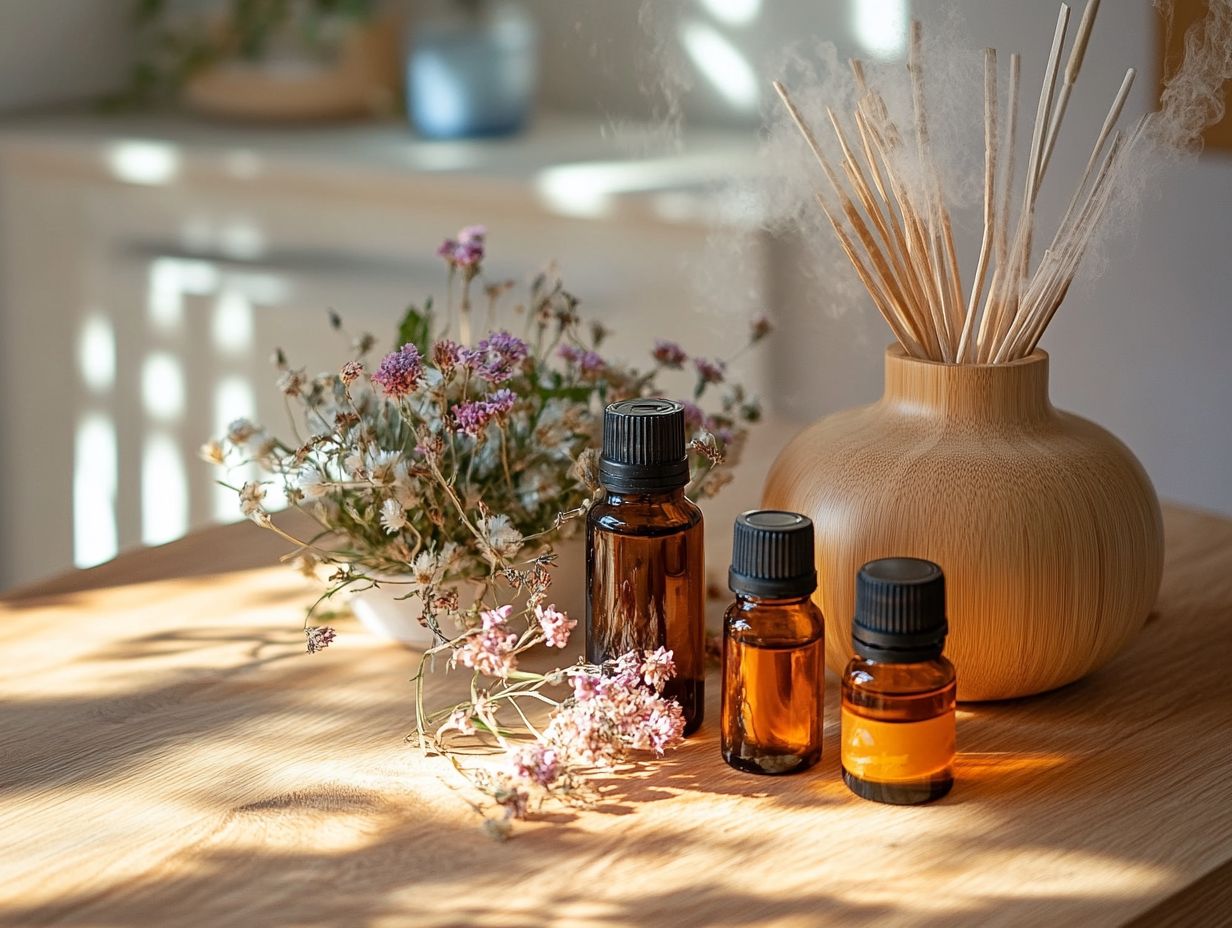
Using a natural air freshener infused with essential oils can elevate the ambiance of any space while promoting a sense of relaxation. Aromatherapy through the use of essential oils like Lavender, Orange Oil, and Bergamot Oil can significantly enhance the atmosphere of your home.
By incorporating a variety of essential oils, you can customize fragrances to uplift your mood, alleviate stress, and cultivate a serene environment. For example, lavender is renowned for its calming properties, making it the perfect choice for bedrooms or meditation spaces.
On the other hand, citrus oils like lemon or orange can invigorate your senses, bringing a refreshing energy to kitchens or living rooms. Blending these oils in a natural air freshener not only masks unwanted odors but also encourages a moment of mindfulness.
This practice invites you to breathe in the soothing scents and focus on the present, enhancing your overall experience. It can significantly contribute to your emotional wellness, fostering a sense of tranquility and balance in your daily life.
3. Homemade Laundry Detergent
Homemade laundry detergent infused with essential oils provides you with a natural alternative to commercial products, ensuring that your clothes emerge fresh and clean. Essential oils like Frankincense and Chamomile Oil are great for adding a soothing fragrance to your laundry.
By choosing this sustainable approach, you can enjoy the advantages of gentler ingredients that effectively tackle stains while remaining kind to both your fabrics and skin. Essential oils not only impart a delightful fragrance that elevates your laundry experience, but they also possess natural odor-fighting qualities, making them ideal for eliminating odors without resorting to harsh chemicals.
This gentle formula is particularly well-suited for sensitive skin, minimizing the risk of irritation and allowing for a soothing laundry routine for everyone in your household. By using eco-friendly ingredients and essential oils, you can create healthful options for your fabrics.
Embracing this method not only promotes sustainability but also enhances the freshness of your everyday garments.
4. DIY Insect Repellent: How to Make It
Create your very own insect repellent and enjoy nature without the bites! Crafting a DIY insect repellent using essential oils is a brilliant way to keep pesky pests at bay while being kind to the environment. Oils like Myrrh, Vetiver, and Spearmint can be highly effective in repelling insects.
This provides a natural alternative to commercial repellents, which often contain harsh chemicals that can jeopardize your health and the ecosystem. Furthermore, it aligns with residential care practices that prioritize natural solutions.
To create this all-natural formula, think about incorporating oils like citronella, lavender, eucalyptus, or tea tree, all renowned for their repellent properties.
Begin by mixing about 10 to 15 drops of your chosen essential oils with a carrier oil, like coconut or jojoba, in a small spray bottle. Give it a good shake, then apply it to any exposed skin and clothing, steering clear of sensitive areas like your eyes and mouth. This homemade solution not only deters insects but also leaves you with a refreshing scent.
Are There Any Risks or Side Effects of Using Essential Oils in Home Care?
While essential oils present many benefits for home care, it’s vital to recognize the potential risks and side effects that can accompany their use. Misapplication or overuse of essential oils might lead to skin irritation, allergic reactions, or even toxicity if ingested. Using essential oils for health care requires a thorough understanding of their properties and safe usage guidelines.
Being aware of these safety concerns is essential for anyone eager to harness the power of essential oils for personal care and home wellness. By taking necessary precautions like conducting patch tests and following proper dilution guidelines you can effectively mitigate these risks and fully enjoy the remarkable health benefits that high-quality essential oils have to offer. Engaging in aromatherapy and body mindfulness can further enhance your overall wellness and experience with essential oils.
1. Skin Irritation
Skin irritation ranks among the most common side effects of using essential oils, particularly when they re applied undiluted. You may experience redness, burning sensations, or even allergic reactions, especially if you have sensitive skin. Being mindful of your body’s reactions can help you manage and prevent adverse effects.
This is largely due to the concentrated nature of essential oils, which can disrupt your skin’s natural barrier when used directly.
To reduce these risks, it s essential to always dilute essential oils with a carrier oil, such as jojoba or coconut oil; this helps temper their potency and protects your skin. Before you go all in, performing a patch test on a small area can reveal your individual tolerance levels.
Educating yourself about specific oils and their unique properties can play a significant role in preventing adverse reactions, ensuring a safe and enjoyable experience with your essential oils.
2. Allergic Reactions
Allergic reactions to essential oils can occur, which is why it s essential to conduct a patch test before full use.
These reactions can present themselves in various ways:
- Mild irritations like redness and itching at the application site
- More serious issues such as hives and swelling
- Respiratory difficulties
To identify an allergic reaction, closely monitor any unexpected changes in your skin or difficulty breathing after applying an essential oil. If you notice any signs of an allergic reaction, stop using the oil immediately and consult a doctor.
In urgent situations, taking an antihistamine may help ease milder symptoms, while more severe reactions might necessitate immediate medical attention to ensure your safety and well-being.
3. Interactions with Medications
Certain essential oils may interact with medications, presenting potential risks for individuals undergoing treatment. Talk to your healthcare provider to ensure safe use of essential oils.
If you’re considering using these natural remedies, it s crucial to consult a healthcare professional, especially if you have any pre-existing health conditions. While these oils are viewed as safe and beneficial, they can sometimes cause unexpected side effects or reduce the effectiveness of prescribed treatments.
For those managing chronic illnesses, it’s particularly important to tread carefully, as the delicate balance of your medication regimen could be disrupted. Seeking guidance from an expert helps you stay informed about possible interactions, empowering you to make safer and more effective choices for your health and self-care.
4. Toxicity with Ingestion
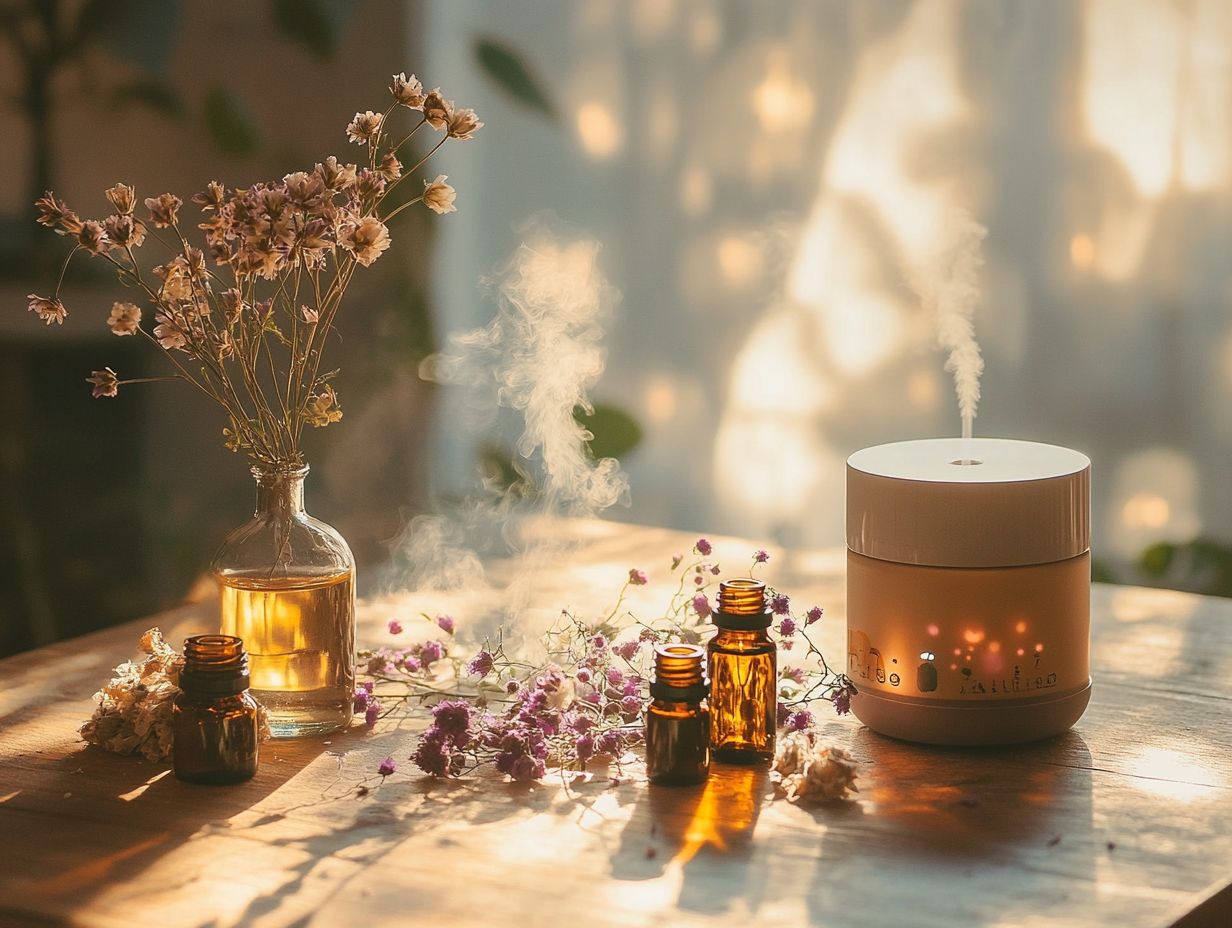
Ingesting essential oils such as lavender, tea tree oil, and peppermint can be very dangerous and should be avoided unless you are under the guidance of a qualified practitioner. These potent substances can lead to adverse reactions, including nausea, liver damage, and potentially even more severe health complications.
It s surprising how many individuals overlook the fact that essential oils can act as irritants or allergens when consumed improperly. If you’re considering using these oils for therapeutic purposes or aromatherapy, it s imperative to consult healthcare professionals who have a solid understanding of essential oils.
Only with their careful supervision should you contemplate ingestion, especially for conditions that might warrant such usage. Even then, it s crucial to adhere strictly to the recommended dosages and methods, as both safety and effectiveness can vary significantly between different oils like lemon oil, orange oil, and rosemary oil.
Prioritizing your health means being informed and cautious in your approach.
Frequently Asked Questions about Residential Care Using Essential Oils
What are essential oils and how can they be used for home care?
Essential oils are concentrated plant extracts known for their benefits. They can be used in a variety of ways for home care, such as cleaning, disinfecting, promoting relaxation, and enhancing mindfulness.
What are the benefits of using essential oils for home care?
Using essential oils for home care provides a natural and non-toxic alternative to conventional cleaning products. They can boost immunity and improve overall well-being through aromatherapy and mindfulness.
Which essential oils are best for cleaning and disinfecting?
Some essential oils known for their antibacterial and antiviral properties include tea tree oil, eucalyptus, peppermint, and lemon oil. These oils can be used to make DIY cleaning solutions that are just as effective as store-bought products.
How can essential oils be used for relaxation and stress relief in the home?
Aromatherapy is a popular way to use essential oils for relaxation and stress relief. Diffusing oils like lavender, chamomile oil, and frankincense can create a calming and peaceful atmosphere in the home.
Are essential oils safe to use around children and pets?
While essential oils can have many benefits, it is essential to use caution when using them around children and pets. Some oils can be harmful if ingested or cause irritation if applied directly to the skin. It is best to talk to your healthcare provider before using essential oils around children and pets, especially oils like cedarwood oil and bergamot oil.
Can essential oils be used for pest control in the home?
Yes, some essential oils have natural insect-repelling properties and can be used for pest control in the home. Oils like citronella, peppermint, and lemongrass are known for keeping insects away and can be used in DIY sprays or diffused in the home. Other oils like myrrh, hyssop, and vetiver can also be effective.
Explore the benefits of essential oils today for a healthier home!

